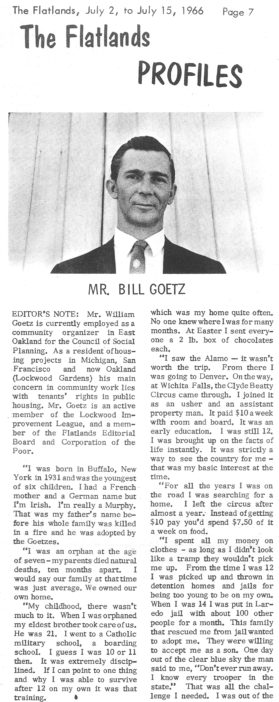One of the core members of The Flatlands’ editorial board was Bill Goetz, who was then serving as a community organizer in East Oakland for the Council of Social Planning.
As this profile details, Goetz had a hard-knock life. Orphaned at age seven, he went, alone, on the road as a young teenager: “From the time I was 12 I was picked up and thrown in detention homes and jails for being too young to be on my own.” After working for a year with a traveling circus, he lived hand-to-mouth, never settling in one place for more than a month.
Goetz was living in the white section of Oakland’s segregated Lockwood Projects (the third of public housing projects in which he lived) when he was ignited by the fight to preserve tenants’ yards, detailed elsewhere on this site. He started organizing the community, and was on his way to the Community People’s Conference in August 1965 when he discovered that he’d been hired by the War on Poverty as a community organizer — a moment that made for “probably one of the happiest times of my life,’ he recounted.
Goetz’s trajectory — from life on the road as a homeless white teen to married living in public housing to a job as a community organizer — suggests one path that led to The Flatlands. The newspaper was dedicated to a democratic vision that involved poor people representing themselves in their own terms — a vision that Goetz embodied in his own life and aimed to spark in others through his organizing work.
